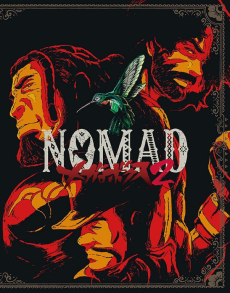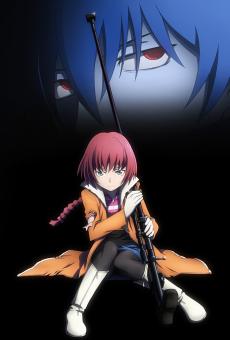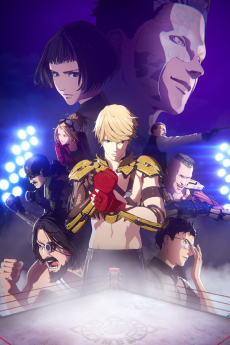NOMAD: MEGALO BOX 2
STATUS
COMPLETE
EPISODES
13
RELEASE
June 27, 2021
LENGTH
24 min
DESCRIPTION
The second season of Megalo Box.
In the end, “Gearless” Joe was the one that reigned as the champion of Megalonia, a first ever megalobox tournament. Fans everywhere were mesmerized by the meteoric rise of Joe who sprung out from the deepest underground ring to the top in mere three months and without the use of gear. Seven years later, “Gearless” Joe was once again fighting in underground matches. Adorned with scars and once again donning his gear, but now known only as Nomad.
(Source: TMS Entertainment)
CAST

Joe

Yoshimasa Hosoya

Chief

Miou Tanaka

Gansaku Nanbu

Shirou Saitou

Yuuri

Hiroki Yasumoto
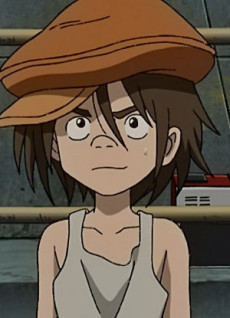
Sachio

Michiyo Murase

Tatsumi Leonard Aragaki

Makoto Tamura

Yukiko Shirato

Nanako Mori

Mac Rosario

Atsushi Miyauchi

Mara

Farahnaz Nikray

Mikio Shirato

Tatsuhisa Suzuki

Edison Liu

Masaya Fukunishi
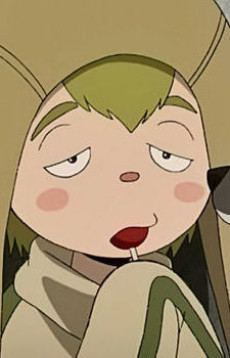
Oicho

Ami Naitou
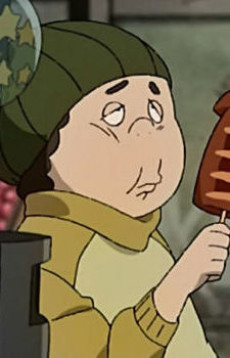
Bonjiri

Reimi
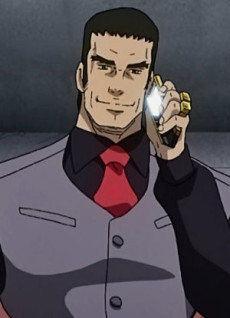
Fujimaki

Hiroyuki Kinoshita
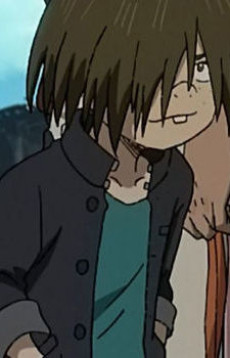
Santa

Momoko Taneichi
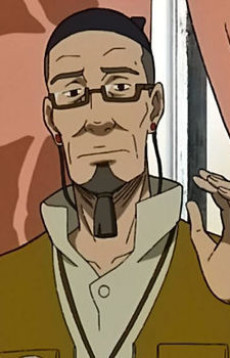
Abuhachi

Mutsumi Sasaki
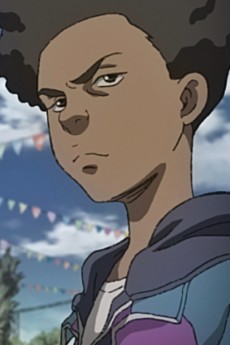
Mio

Yumi Hino

Marguerite Asamoto

Akari Higuchi

Tomoka Yoshimura

Tomo Muranaka

Hakeem

Volcano Oota
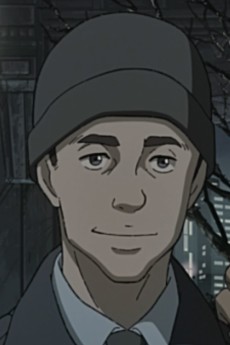
Tanaka

Kento Shiraishi

Jimmy

Shouzou Sasaki

Ryugo Sakuma
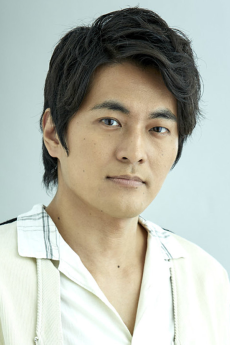
Chikahiro Kobayashi

Condor Kunimura

Yasuhiro Mamiya

Doumoto

Jin Urayama
EPISODES
Dubbed
RELATED TO NOMAD: MEGALO BOX 2
REVIEWS

IGOR
90/100An amazing sequel to a great anime.Continue on AniListWarning! season 1 spoilers: Idk why you would be reading this if you haven’t seen season 1, BUT GO WATCH SEASON 1!!!!!
After watching Megalo box season 1 I didn’t think there would be a season 2. season 1 wrapped up so nicely I didn’t really feel the need for season 2 but here we are with season 2 and HOLY SHIT!! It's fucking amazing.
Season 2 focuses on the aftermath of season 1. After Joe achieved his goal of becoming a Megalo box champion it seemed like we got a happy ending. Unexpectedly we were completely wrong, season 1 ended in the worst way possible. Joe is now a drug addict who is fighting in underground matches after losing his champion title, pops is dead, team nowhere Is broken up, and life just sucks for everyone.

That right there is exactly why I liked season 2 right away. Sports anime tends to focus too much on the sport and can become very repetitive, but with Megalo box that’s not the case, this anime is more than just boxing it’s about the characters and their development, it’s about fighting for what you care about, it’s about finding a group of people you can call your family and place you can call your home.

You’re going to meet plenty of new characters this season and all of them are great in their own ways. Many of them are dealing with issues that some of us in real life might be able to relate to. For example Chief, Chief is a great character who is similar to Joe in a way. Chief is fighting for his home and family, after being discriminated against and told that they will have to leave their home.

I loved Megalo box season 1 because of the aesthetic and the music. The anime gave off 90’s anime vibes and the music was so good. Season 2 does not drop in quality when it comes to animation and music, everything still looks and sounds great, and I love the Spanish ED.
If your only here for the sport and wants to know if there are still boxing matches and if they’re still great. The answer to that would be Yes. The fights are still great and you will see like 1 boxing match an episode, these boxing matches are animated pretty well. However like I said earlier, THIS ANIME IS MORE THAN JUST A BOXING ANIME.
Watching Megalo box season 2 felt completely different compared to watching season 1, the tone in this season is much darker and feels much more serious. Which is great because sports anime tend to be shounen and sometime its not really mature or serious (which isn't a bad thing, it's good in its own way.) where as this is the complete opposite.
Overall I think this season was a great sequel to season 1. The animation and music is still just as good as season 1 maybe a little better in some occasions. I loved how this season was way more serious than season 1. It’s crazy to me how little exposure this anime has and how underrated season 1 was.

Lenlo
83/100It feels like we are seeing Megalo Box, and not just Ashita no Joe with robots, for the first timeContinue on AniList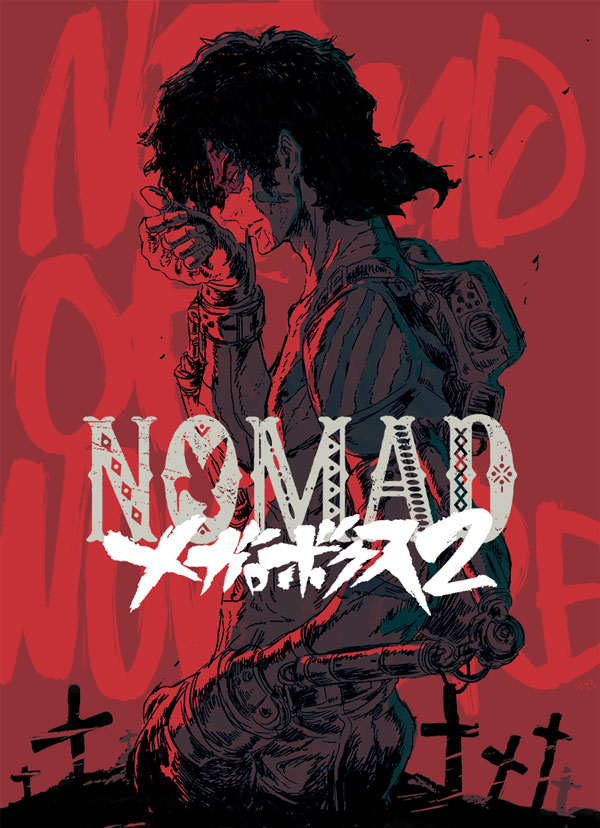
Megalo Box first aired in the Summer season of 2018. Part of the 50 year anniversary for the legendary series Ashita no Joe it was... satisfactory. It brought anime fans back to a different time, an older time, in ways good and bad. Yet despite ostensibly being an "Original" Megalo Box was so heavily tied to Ashita no Joe that it couldn't escape the comparisons. The story felt like a retelling of something we got 50 years ago, smashed into a 13 episode season. And while some, myself included, still enjoyed the series it felt like something was missing. In Nomad we find that something. While while watching Nomad I felt like I was watching Megalo Box for the first time. The real Megalo Box, more than just a copy of Ashita no Joe, what the series was always meant to be. And I love it.
Created by TMS Entertainment, jointly written by Katsuhiko Manabe and Kensaku Kojima, and directed by You Moriyama I give to you my Summer 2021 Anime of the Season: Megalo Box: Nomad. Let's dive in
Be warned, this review contains minor unmarked spoilers for Megalo Box: Nomad. It also contains major spoilers in some sections however these will be heavily marked to avoid accidents.

Visuals Like always the best place to start is with the visuals. And compared to everything else about the show it is here that Nomad has evolved the least. If you enjoyed the aesthetic and style of the first season than this is a good thing! The lines are still rough, the colors bright and the backgrounds detailed. If anything the art has only gotten rougher and heavier as the linework on characters appears to ebb and flow, both in thickness and intensity. Perhaps there is an overreliance on dark browns and greens early on, making darker scenes difficult to see at times. But I quite like it myself! It’s generally a very striking style that stands out among the clean, digital art we see in most anime today. Sadly there is one major flaw, or perhaps… eccentricity depending on how you look at it, to Nomad’s style. The resolution.
Just like it’s predecessor Nomad goes to absurd lengths to recreate that feeling of watching an older anime. That feeling of watching a 480p or 720p show on an HD monitor. And it does this by upscaling. By rendering/creating the footage at a lower native resolution and then forcing it to up to HD, 1080p (Learn more here). It might not look it because of the size of the screen shots here but the effect is noticeable. Initially this is rather novel and suits Nomad well. It truly does feel older. But as the show goes on, as you get used to it, it starts to become… annoying. The beautiful backgrounds can become ruined by the resolution switch, characters can become fuzzy and lighting difficult. As much as its a part of Megalo Box’s unique visual style I can’t help but wish it was done away with.
This brings me to Nomad’s animation and all I can say is that, like the art, it hasn’t changed much. Just like the first season, Nomad isn’t what I would call a powerhouse. Don’t get me wrong, there are some great cuts! Shinichi Kurita created one of my favorite scenes of the season. When Nomad wants to it’s rougher, looser style of art and design allow for some great movement. But that’s the issue: When it wants to. And Nomad generally doesn’t. The cuts above are a small, small minority in Nomad. Fights often feel slow and plodding, impacts are weak and sometimes you can’t even tell if a punch landed or not. Even the final fight felt lacking here! Is this upsetting? A little bit, yes. But unlike the Megalo Box’s first season Nomad doesn’t actually have that many fights. Or rather, they aren’t the focus of the show.
What I’m saying is that if you came to Nomad for hype fights and fantastic action sequences you will be disappointed. You will often go an entire episode without a single punch being thrown or fight even talked about. And the fights you do get? Well only 2 really made me “wow” at the visuals. It’s outside those fights, in the scenic views and gorgeous backgrounds, that you will find Nomad’s true worth. The quiet moments where the characters and the story are front and center. Because that’s what Nomad is really bringing to the table, where it’s strengths lie: The narrative. And what a fantastic narrative it is.

Narrative Nomad's story is easily my favorite part of the show. It's not perfect, and we will talk about why, but it is emotionally effecting. And not in that sappy melodrama sort of way, with signs that say "CRY NOW" in all caps. Rather, its a very human story, one that speaks to our lives as a whole instead of a singular moment or experience. It's a story about home and family. About making mistakes, recognizing them and then moving forward with your life despite them. Of not letting who you were define who you are. And in that sense I think Nomad's story isn't just about the characters, but about the show as a whole. Just like Joe must accept his past and work towards a new future with his chosen family, Megalo Box must accepts it's Ashita no Joe roots and strike out to be more than a retelling.
Enough fancy meaning and symbolism behind Nomad's story though, lets get into the nitty gritty! Set 7 years after the events of season one, Nomad follows "Gearless" Joe, once again alone in the world. Traveling the desert, fighting in underground matches, what happened to Joe? Where did Gansaku, Sachio, Yuri and Aragaki go? I won't spoil those here, suffice to say a lot has happened in the time skip. Structure wise, Nomad's story can be split into two main arcs, or halves, of the season. The first arc is easily my favorite as Joe travels the desert, meets a group of immigrants, listens to their story and comes to learn what it means to be "home". Meanwhile the second arc deals with Joe's return to the city and his reunification with his family along with a side-plot involving Shirato, big tech and a new antagonist named Sakuma. Interested? Read on.
This is where I have to dive a bit into spoiler territory if I want to have any kind of meaningful discussion about Nomad's narrative. If you haven't watched the show you can skip this bit and go to my conclusion where I say "This is pretty damn good!". However if you have watched the show then click here and let's talk some light spoilers. And if this section seems to short don't worry, I talk about how much I love the theme's later.
First up, the first half! This is without a doubt my favorite part of Nomad. It takes Joe out of the ring and puts him into the shoes of the coach. Letting him experience what it's like for a fighter to put their life in his hands and to put his trust in the fighter. Trust that they will win and return home alive. All the while watching from the sidelines unable to anything to help until they come back to you. Meanwhile Chief, the best new character, teaches Joe what it means to have a home to return to. How families, chosen or otherwise, aren't destroyed by a single argument but by the individuals giving up on them. And the entire time it does this through the lens of the immigrant experience as Chief's community struggles to find a home in a new land. It's incredible.
This brings me to the second half of Nomad's story where it starts to flag a little. Here Joe returns home to the city and tries to reconnect with his estranged family, Team Nowhere. All of that is great stuff! His conflict with Sachio, how all of the orphans have moved on after he left and how he has to earn their trust back after disappearing all those years ago. But where Nomad missteps a bit is the introduction of Mac and the Rosco Corporation. On his own Mac's story works well, it's another exploration of "Family" and in many ways acts as a mirror to Joe's. However at times it feels like this arc, mostly the Rosco Corp's stuff, comes to overshadow the more familial themes. That this focus on corporate scheming and profit takes away from what made the first half good.
And that's basically the main thrust of the argument with Nomad. Whenever it's focusing on themes of family, immigration, hope, etc, it's really good! But whenever it breaks away from that and starts to involve other factors, like the military industrial complex and mega-corporations, it feels like it loses focus. Luckily Nomad manages to bring this all back together pretty well. It was shaky for a few episodes but through Mac, Nomad connects even this disparate threads to the main story. It takes Rosco Corp, everything about it, and turns it into a tale of exploitation. Of how big corporations will prey on the poor, the immigrant communities, to turn a quick buck and then throw them away when they are done. It explores class dynamics and the disparity in medical treatments, and how the costs for those treatments hang over the lives of many families.
To sum it all up what I'm saying here is this: Nomad tells a really ambitious story. One of inspired hope and damaged idols. Of found families and new homes. A story that can connect with anyone that has ever moved somewhere far away from home in search of work or a new life, whether it be to another country or even another State, etc. A story that is, at times, to ambitious and tries to cast its net to wide. Ultimately I think Nomad succeeds. It manages to bring all of these arcs together into a conclusive and satisfactory conclusion. But there were a few bumps along the way and in some places its desire to tell a heartfelt story conflicted with its need for boxing action set pieces.
Also the Latin theming is just gorgeous. I'll talk about this more in the OST section, I promise, but... just trust me when I say we need more Latin American/Spanish themed anime. Please.

Characters That brings me to the characters! Though with how tightly they are tied to Nomad's story we've already largely covered them. Overall I would say Nomad has a pretty strong cast, both old and new. Naturally there the returning characters such as Joe, Sachio and the rest of the family. All of whom feel like good continuations of who they were in Megalo Box after the 7 year time skip. Their motivations, their relationships, their goals, all of these are compelling and make sense! Joe in particular has undergone a major transformation and its presented well. Indeed the only major complaint I have is that Nomad relies a bit to much on flashbacks to tell their stories. Often jumping us back 5 years for half an episode at a time to give us more backstory when I would rather it show us the effects of such history in the present.
So rather than spend a lot of time having a spoiled discussion about Joe, Gansaku and Sachio let's instead talk about the new characters and how they influence the old. I am of course talking about Chief, Mac and Sakuma, the three big new additions for the cast. Chief is pretty straight forward, he's the best character in the show. This is a man who has gone through everything Joe is now, who was inspired by Joe to come to this land, who never lets the world beat him down, a paragon. He is the ideal that Joe wants to become but doesn't think he is worthy of. Yet he isn't a Gary Stu either. Chief's made mistakes, he's susceptible to anger and all the emotions we feel. He's a broken man just like Joe, but one who has found a home and is determined to keep it.
Next we have Mac, mirroring another facet of Joe: The one 7 years past. Where Chief is what Joe aspires to be, Mac is what Joe was. Someone in the process of breaking his family through actions that are not his fault but that he still feels responsible for. Mac is here to show that it's never to late to fix things. That running away, for however short a time, only makes things worse. Meanwhile outside of his connection to Joe, Mac also takes the reins of Nomad's theme's surrounding immigration. How good men can be inspired, find a life and a family in a new land, be accepted by their communities. Where Chief and his people were being pushed out, Mac has become the local hero. Yet the sorts of problems that plague Joe, Chief and Mac are not limited to any one social class. They are universal.
Finally out of the 3 major new characters we come to Sakuma. Sakuma is... he's complicated. Not in his story, of that he's rather straight forward. Sakuma quite literally represents the willingness of big corporations to take advantage of the poor, the disenfranchised, for their own personal gain, consequences be damned. He views the world from his ivory tower and doesn't have a care in the world for the lives he is destroying and in that he fills his roll well. However throughout many of his early scenes Sakuma felt... out of place? Like he was part of a larger story that Nomad didn't need to tell. Like a blatant villain thrown into a story of complex characters just for the sake of having one. Ultimately I think his presence works fine for Nomad. But your mileage may vary.
All in all I would say that Nomad has a pretty good cast of characters. They are brought down a bit by Sakuma and his assistant for me but only because the rest are just... so damn good. Joe, Chief, Mac, their families, how their stories intertwine, etc. All of that is fantastic. If you don't mind a bit of Billionaire Tech Mogul thrown in for everyone to unite against then I think you will have a grand time with Nomad.

OST/Sound Design EDIT: You can find the full OST here
Finally, in the last "real" section of this review, I get to to talk about the OST and sound design! And if you know anything about the first season of Megalo Box you know that's OST was fantastic. Manabu Yamaguchi, AKA Mabanua and the man responsible for the soundtracks of Megalo Box, Nomad and BNA, incredibly talented. He can take a setting, whether it be a bustling city or lonely desert, distill its essence and infuse that into his music. Take a listen to his original Megalo Box soundtrack if you don't believe me. From the melancholic and simple tones of "Sachio's Theme" or the almost community driven "The Slum" to the high class strings of "Yukiko's Theme" or the thrumming reverb in main theme "MEGALOBOX". It was my favorite OST of 2018. And Nomad is my favorite OST of 2021 so far. Thanks Mabanua.
Now you might ask me, "Lenlo why are you bringing up Megalo Box's OST so much"? Well aside from because its awesome, the answer to that is because a lot of it reappears in Nomad. As the story shifts back to the city the original themes begin to return. There are variations of course, shifts in instruments, pacing or mood for the tracks along with a couple new ones to match how the characters have changed. This is pretty cool! Not only does this let us hear, as well as see, how the characters of changed but it changes the feel of the entire show. The music is changing not only to fit the emotions on screen but our location in the world as well. Giving each location a distinct sound, unique to them. So, if Megalo Box is the city sound and all, then what is Nomad?
Nomad my dear friend is LATIN FIRE. Seriously just give this track from episode one, "El Canto del Colibrí", a listen. While I can't speak to the authenticity of the lyrics or their pronunciation, since I don't speak Spanish, I can at least say they sound authentic. That when paired with the guitar and Mabanua's soft-spoken way of singing it evokes images of Latin America, of the culture and their way of life. And this sort of sound permeates the first arc. It pains me that the OST isn't released so I can't give you good, direct links to the music so you will just have to take my word on this: Nomad lives and breathes this setting, this culture. And while in the second half it fades away to make room for the more city oriented music, what we get is incredible. More anime need to use Latin music.
This brings me to sound design, the "boring" part of this section. I say boring because I'm not a sound engineer! I can't speak to the quality of sound, whether they come from existing libraries or anything like that. All I can do is say whether or not they impacted my enjoyment one way or another. And the answer? Not really. I was never taken out of the moment by the sounds, they never felt out of place. Similarly though I was never really wowed by them. Part of me thinks this is a conscious choice on Nomad's part though. That it's sounds try to stay in the background so that the music, the real star, can take center stage. Whether its intentional or not though, that's the effect. The way Nomad mixes its sound allows the music to reign. And since I love the music, I say good choice.

Trials of Immigration And with that we are done with the official part of the review! This bit here is just a place for me to ramble a bit and talk about Nomad without any sort of set structure or singular topic. It's where I spoil the absolute hell out of the series and talk about what makes it special for me. Basically it exists to let you, dear reader, have a look into my head and see what I connected with. Might even spark a conversation, who knows. So you don't mind MAJOR spoils or have watched the show then feel free to read on. Otherwise skip it and come back later. In we go!
Nomad starts in a really weird place. It's a 7 year timeskip from the end of Megalo Box, Joe is alone and addicted to painkillers, traveling a desert. Gansaku is dead, the family is broken up and I'm just sitting here wondering "What the hell happened". I can't think of a stronger way for Nomad to break off and differentiate itself from Megalo Box, from Ashita no Joe, than to literally abandon all the trappings of it's first season. This immediately sets the tone as not only is Joe looking for a home, looking for a place to belong, Nomad is to. The show itself is trying to find out what it is and where it belongs. And while the answer it eventually arrives at is back where it started, like Joe, it's relationship with that starting point has changed drastically. Now it belongs, on it's own terms.
So, how does this tie back into immigration, the title of this section? It's actually rather simple: Joe, and Nomad as a whole, aren't the only things looking for a home. Indeed, it's actually the entire cast. But Nomad pays particular attention to two men who mirror Joe in many ways, Chief and Mac, and their experiences searching for and creating their own home in a new land. I mentioned it above but this is something a lot of people can connect with and relate to, no matter how far you are moving. And while Nomad makes fantastic use of the culture and sound, its not a uniquely Latin American experience either. The feeling of being ostracized, discriminated against for your race, disparaged and mocked despite everything you do speaking to the contrary. Of having blame laid at your feet for things you never did. Nomad captures this incredibly well.
We first see it with Chief and Mara. How they are attempting to take something no one wanted, an abandoned amusement park, and turn it into a community. How they have to fight for everything they have but still maintain their humanity despite all of the inhumanity that surrounds them. Showing us life from their perspective and how unfair and cruel the actions of those already living there may be, whether you notice them or not. They are victims of persecution yes, but they don't let that define them. Chief stands strong in the face of it, becoming a paragon of virtue in the show all the way until the end, despite how many characters in Nomad describe him and his community. Nomad uses him to say "Look! You're wrong! These are not bad people, they are not lesser, they are just like you and me, dreams and all!".
This brings me to Mac who approaches the same experience but from a different angle. Where Chief and Mara are just getting started in this new land, Mac has been here awhile. He's successful, he found a home and family, earned a proud career guarding his community. And yet despite all of that the exploitation continues. This time it's not from the community, who has largely accepted him, but from the big corporations who want to use him. Who want to be seen and connected with the "successful" immigrant, who wants to use his story for their own profit. And when they are done, when Mac wants to cut ties and remove the BES chip? They are prepared to throw him away without a single thought to his own health and safety.
And while this part of the narrative isn't as cleanly put together as the first, mostly due to Sakuma and the corporate politicking sucking up a lot of it's time, I still found it effecting. Nomad tapped into something special here. Managed to connect with a part of the human experience in a way that I don't think many anime have. Many try of course! Shallow attempts at depicting racism or class struggles are a dime a dozen. But Nomad pulled it off with such authenticity, such are for how its depicted, that I can't help but love it. So despite the production woes, despite the imperfect 2nd half and Sakuma's role in the whole thing, I think Nomad did a great job here.
I realize I rambled for a bit there but that's sort of what this section is. A stream-of-consciousness visit into my head. I hope it helped you see what I did in Nomad.

Conclusion So! All in all, when everything is said and done and boiled down to a single paragraph, how was Megalo Box: Nomad? After ~4000 words this is the answer I have come to: Its pretty good. The production has some issues and it makes some stylistic choices that I don't like, sure. Nomad really could have done without the upscaling and the final fight definitely didn't get the treatment it deserved. But the story, characters and themes of the work engaged me in ways nothing else could this season. I loved their journey, their arcs, and the satisfying, happy conclusion it brought. It's not often an anime really earns its happy ending. But Nomad certainly did.

Groenboys
91/100"Will you listen to my song, Nomad?" - The HummingbirdContinue on AniListAs the wind whirled by, a hummingbird appeared before the Nomad as they made their way through the wasteland. The hummingbird asked "Will you listen to my song, Nomad?" "I'm in a hurry, ask someone else" Nomad said. But the hummingbird wouldn't give up and pursued the Nomad. The hummingbird asked again "Please, I must sing my song." "You're rather selfish. Sorry, but I' m just not in the mood. I'm on a journey to die" Nomad said. "But that's ridiculous. Who goes on a journey to die?" the humminbird asked. "It's the truth. Why would I bother lying before I die?" Nomad said. But the hummingbird refused to give up.
Megalo Box season 1 felt like it was all wrapped up nicely. It was a really good action series that halfway through turned into a story containing various character studies. It was quite the shift in tone and it turned many audiences, including me, of. Then Megalo Box Nomad got announced, and I just had the biggest questions. How would you follow up a story as conclusive as the first season? Having finished the anime, I have found the awnser: There still was a lot of story to tell.
From the first episode of Nomad, it gave a clear message: This will be different. We see our protagonist Joe several years after the final of season 1 completely washed up. Between this season and the first season, a lot has clearly happened. Joe is addicted to pain killers, he is back doing underground megalo matches, and he has Nanbu following him around, berating Joe of what he had done. While this is the darkest episode from this entire season, what follows is still a breathtaking story. We meet new characters which Joe's actions in the first season clearly had an effect on them, and we see how these characters effect Joe now. In between the years, the old characters from the first season have changed, but the past still holds them by the throat each single day, including Joe. Even with Nomad threading similar grounds, the timeskip and new perspective differentiates this story from the first season and elevates the first season in the process.
What really elevates the story to a higher level is the story of Nomad and the Hummingbird. The whole anime revolves around that story of the Nomad on his journey to die and the hummingbird wanting to sing his song. From hummingbird symbols to Joe's boxing name being Nomad to the story of Nomad and the Hummingbird directly being told, everything comes back to this story and it is great.
And since we are talking about a Spanish story, one of the best things of the anime are the spanish influences on the whole show. The show involves a lot of spanish immigrants who tell their stories of their joureny. The show also features spanish symbols, spanish stories and spanish festivals. The new OST is heavily influenced by spanish music and it is gorgeous. All of the spanish influences really puts a thoughtful spin on this sports anime and gives it a fully unique feeling in comparison to every other anime.
It is hard to really describe what makes Nomad such a great anime without spoiling everything. Hell, even if I would spoil everything, I would still have a hard time writing my thoughts since the best part of the anime is the symbolism, and that is not my strongest suit to talk about. But I can say this: Megalobox Nomad is an unique emotional journey that elevates itself beyond just being a sequel. Even if you have a hard time going through the first season, it is absolutely worth watching the first to watch this second season.
SIMILAR ANIMES YOU MAY LIKE
 ANIME ActionAfro Samurai
ANIME ActionAfro Samurai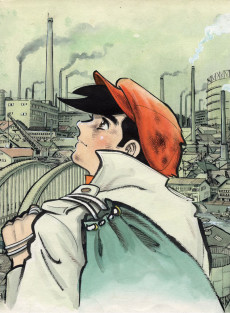 ANIME ActionAshita no Joe
ANIME ActionAshita no Joe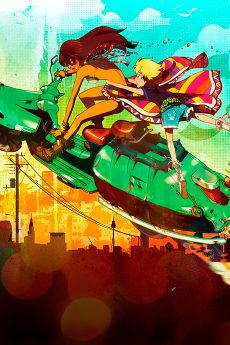 ANIME ActionMichiko to Hatchin
ANIME ActionMichiko to Hatchin ANIME ActionAshita no Joe 2
ANIME ActionAshita no Joe 2 ANIME ActionSamurai Champloo
ANIME ActionSamurai Champloo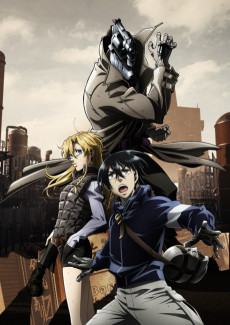 ANIME ActionNo Guns Life
ANIME ActionNo Guns Life ANIME PsychologicalGyakkyou Burai Kaiji: Ultimate Survivor
ANIME PsychologicalGyakkyou Burai Kaiji: Ultimate Survivor
SCORE
- (4.05/5)
TRAILER
MORE INFO
Ended inJune 27, 2021
Main Studio TMS Entertainment
Favorited by 1,356 Users
Hashtag #MEGALOBOX #メガロボクス




